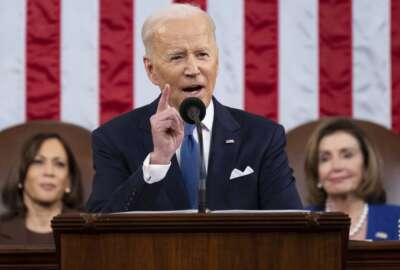
Biden lays out how administration plans to go after COVID fraudsters
In today's Federal Newscast, President Biden says an executive order is in the works that will help agencies prevent and detect identity theft linked to COVID-19...
To listen to the Federal Newscast on your phone or mobile device, subscribe in PodcastOne or Apple Podcasts. The best listening experience on desktop can be found using Chrome, Firefox or Safari.
- President Joe Biden calls for federal employees to lead the charge on returning to the office. President Biden in his State of the Union address said the federal workforce will serve as a model for more Americans to return to the office. “It’s time for Americans to get back to work and fill our great downtowns again. People working from home can feel safe to begin to return to the office. We’re doing that here in the federal government. The vast majority of federal workers will once again work in person.” The administration will also allow households to order more free rapid COVID tests at CovidTests.gov starting next week, even if they already ordered free tests through the site. (Federal News Network)
- President Biden said an executive order is in the works that will help agencies prevent and detect identity theft linked to COVID-19 relief programs, and would give more support to victims of identity theft. The White House said the Justice Department’s COVID-19 Fraud Enforcement Task Force will also appoint a chief prosecutor to tackle pandemic fraud caused by criminal syndicates. Biden, in his State of the Union address, called on Congress to give additional resources to DoJ’s task force, and to increase criminal penalties for pandemic-related fraud.
- Also included in the president’s address last night, a new initiative to improve the quality of nursing homes nationwide. White House officials have already released a plan with 20 separate actions, the main one being a new requirement for minimum staffing levels. Biden is ordering the Centers for Medicare and Medicaid Services to conduct a study on staffing and publish proposed regulations within a year. (Federal News Network)
- The Federal Emergency Management Agency works to correct some longstanding workforce issues. Over the past several years, FEMA has faced challenges with staffing shortages, qualifications, development, and workplace harassment and discrimination. FEMA Deputy Administrator Erik Hooks told lawmakers that FEMA is partnering with historically Black colleges and universities to diversify its workforce. It’s requiring harassment training and conducting listening sessions and exit interviews. And it’s working with Congress to provide protections for its reservists so they can participate in more training.
- NASA begins another technology consolidation effort. The agency takes the first step in bringing together disparate business system applications and platforms. The space agency released a request for information and draft performance work statement outlining five goals under its NASA Consolidated Platform and Application Services contract. Through the RFI, NASA is seeking general IT, customer support, information management services and the integration of the currently decentralized support contracts. Responses to the RFI and draft statement of work are due March 10. NASA said it will release the final RFP through GSA’s Alliant 2 GWAC by July with an award by February.
- Small businesses from all socioeconomic categories will have their shot at the next great governmentwide acquisition contract from the General Services Administration. GSA released its small business strategy for the services MAC vehicle that is under development to replace the popular OASIS contract. GSA said it expects to create six services vehicles under the services MAC umbrella with one each for 8(a), HUBZone, Service-Disabled Veteran-Owned, women-owned and total Small Business as well as one that is unrestricted. Later this month, GSA said it will release the proposed evaluation criteria for the vehicle.
- A new audit finds the Pentagon’s cutting edge research could be at risk of cyber attacks. The Defense Department’s research partners are not consistently using cybersecurity controls to protect sensitive information. That’s according to a partially redacted audit released by the DoD Inspector General. The IG evaluated 10 of the military’s academic and research contractors. Some failed to use multifactor authentication, while others neglected to monitor network traffic and vulnerabilities, among other shortcomings. The DoD IG is recommending the Pentagon assess contractor compliance with existing cybersecurity requirements.
- New cybersecurity requirements for agencies and businesses are moving forward in Congress. The Senate passed the Strengthening American Cybersecurity Act of 2022 yesterday. The bill would update federal cyber standards and push agencies to adopt zero trust security measures. It would also require critical infrastructure operators to report cyber attacks to the government. And the bill would establish a new Federal Secure Cloud Advisory Committee to ensure agencies and industry are collaborating.
- The Postal Service will soon let households forward their mail to a new address for a longer period of time. USPS will still forward mail to customers for up to a year at no cost. But starting this summer, USPS will allow customers to extend this mail-forwarding service for up to 18 months for an additional fee. USPS conducted a market test of this new service in 2020, when the COVID-19 pandemic led to an uptick in permanent change of address requests.
- Thrift Savings Plan funds closed out February largely in the red yet trending upward. This comes after a month of disappointing returns in January. Overall, the S-fund made the most gains, rising by 10.1 percentage points. Compared to a year ago, most of the individual funds are down and all Lifecycle funds had lower returns year-over-year, continuing the trend since December. (Federal News Network)
Copyright © 2025 Federal News Network. All rights reserved. This website is not intended for users located within the European Economic Area.
Eric White
Eric White is news anchor and Federal Drive producer at Federal News Network.
Follow @FEDERALNEWSCAST
Related Stories
Getty Images/iStockphoto/Traitov




